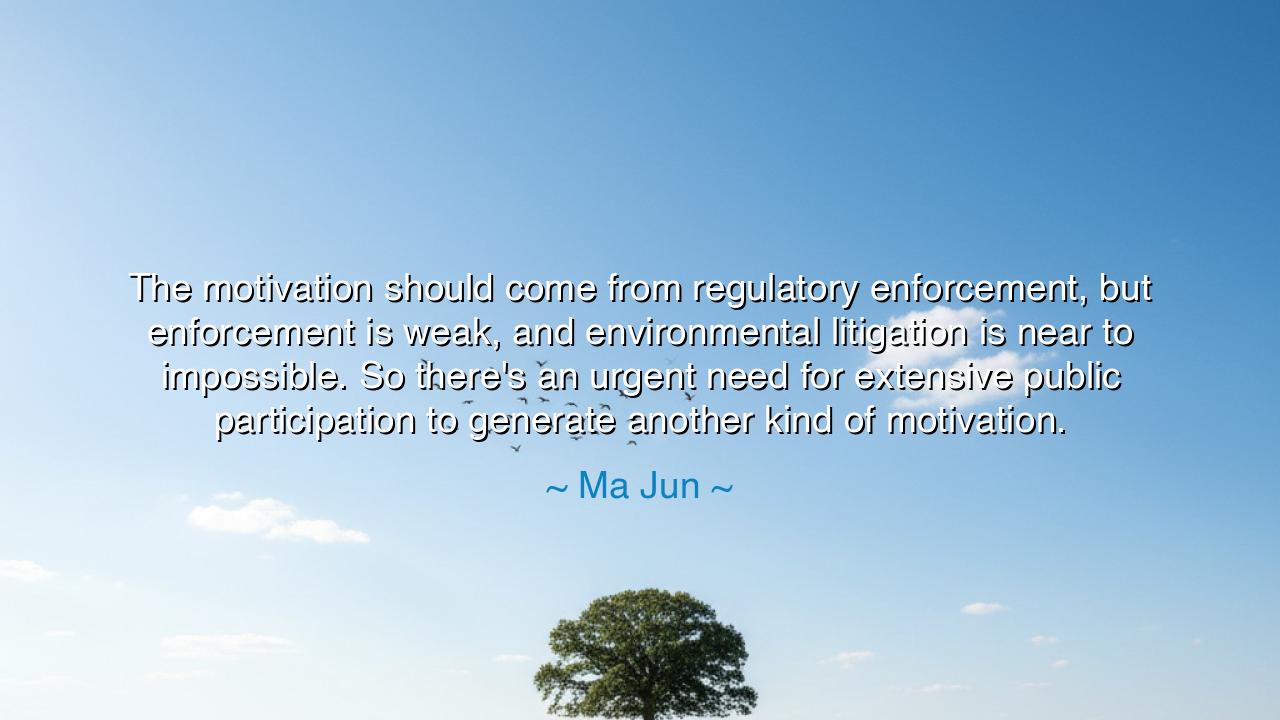
The motivation should come from regulatory enforcement, but
The motivation should come from regulatory enforcement, but enforcement is weak, and environmental litigation is near to impossible. So there's an urgent need for extensive public participation to generate another kind of motivation.






In the calm yet resolute voice of a modern sage, Ma Jun declared, “The motivation should come from regulatory enforcement, but enforcement is weak, and environmental litigation is near to impossible. So there's an urgent need for extensive public participation to generate another kind of motivation.” These words, though born from the soil of China’s environmental struggle, resonate with the weight of a universal truth. They speak to the eternal tension between authority and conscience, between the power of laws and the power of people. In his voice, we hear both frustration and hope—a call not only for reform but for awakening.
The origin of this quote lies in Ma Jun’s tireless work as an environmental activist and researcher, known for his groundbreaking “Water Pollution Map” and his fight to hold polluting industries accountable. Living in a time when China’s rapid industrial rise brought both prosperity and peril, Ma Jun witnessed how the machinery of progress often outpaced the reach of regulation. Factories poured toxins into rivers; the air grew thick with smog. Though laws existed to prevent such harm, enforcement was faint—a whisper drowned out by the roar of profit and bureaucracy. In this vacuum, Ma Jun saw the need for a new force, one not written into codes or decrees: the will of the people.
To the ancients, this idea would have been recognized as the principle of shared stewardship. In the days of Aristotle, the philosopher warned that when rulers fail to govern with justice, it is the duty of citizens to act for the common good. Likewise, in the teachings of Confucius, the harmony of a nation depends not solely upon its rulers, but upon the virtue of its people. Ma Jun’s words are a reflection of this old wisdom reborn: when the keepers of order grow weak, the responsibility of preservation passes to the hearts of the many. The environment, like the temple of a forgotten god, must then be defended not by decree, but by devotion.
When Ma Jun speaks of “public participation,” he is invoking the great power of collective conscience—the ability of ordinary citizens to become guardians of their own world. In his vision, true environmental protection cannot depend solely on distant officials; it must rise from the villages, the cities, the riversides, and the streets. For when the people act, they create a new kind of motivation—one driven not by fear of punishment, but by love for home. This idea transforms environmentalism from a policy into a movement, from legislation into living will.
History has shown this truth in action. In the 1950s, the citizens of Minamata, Japan, faced a terrible plague: mercury poisoning from factory waste that killed thousands and scarred generations. At first, the government was silent, and the corporation responsible denied all wrongdoing. Yet it was the persistence of the villagers, the mothers and fishermen who refused to yield, that forced the world to see the truth. Through protest, documentation, and solidarity, they achieved what law alone could not—the restoration of justice. Their courage became a symbol of the people’s power to defend the earth when institutions fail. Ma Jun’s words echo their spirit: when laws falter, conscience must rise.
Yet his warning carries sorrow as well as hope. The “weak enforcement” he describes is not merely a flaw of policy—it is the symptom of a deeper ailment: the separation of human ambition from moral duty. When governments prioritize growth above goodness, or when corporations place profit before the planet, the soul of society begins to decay. The antidote, Ma Jun reminds us, lies not in despair but in participation. For every citizen who chooses to care, to speak, to act, becomes a spark of renewal—proof that civilization’s conscience is not yet extinguished.
Let this be the lesson his wisdom offers to all generations: do not wait for permission to do what is right. The defense of the world is not the burden of a few but the calling of all. When institutions falter, let compassion take their place. When the law grows silent, let the voice of the people rise like thunder. Each act of care, each voice lifted for justice, becomes a thread in the great tapestry of renewal.
So remember, children of the earth: the motivation for change does not always flow from the top—it begins in the hearts of the many. As Ma Jun teaches, the rivers, the forests, and the skies belong to us all, and so too does their salvation. Let your care become your power, your action become your voice, and your voice become the law that no ruler can silence. For when the people stand together, they become what governments could never fully be—the living guardians of the world.






AAdministratorAdministrator
Welcome, honored guests. Please leave a comment, we will respond soon